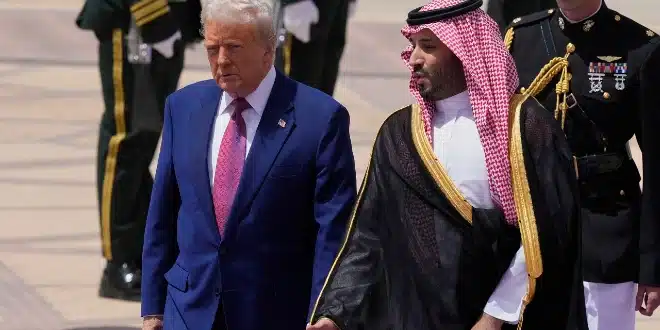U.S. President Donald Trump began his first major overseas trip of his second term with a high-profile visit to Saudi Arabia, marked by ceremonial grandeur and significant economic commitments. The trip opened with the announcement of a $600 billion investment pledge from Saudi Arabia, accompanied by a series of cooperation agreements spanning economic and defense sectors.
Trump’s arrival was met with a military escort, including fighter jets and a ceremonial cavalry unit that accompanied his convoy to the royal palace. Under elaborate chandeliers in the official reception hall, Trump greeted Crown Prince Mohammed bin Salman and acknowledged the investment deal, adding a light-hearted suggestion that the figure should reach $1 trillion. He stated that the agreements would translate into approximately two million new jobs in the United States.
Business leaders from both countries attended the event, including Elon Musk, who joined the Saudi reception wearing a formal suit. The gathering culminated in the ceremonial signing of numerous bilateral agreements, signaling a continuation of the strategic partnership between Washington and Riyadh.
Regional Dynamics and Broader Diplomatic Goals
Trump’s itinerary also includes visits to Qatar and the United Arab Emirates later in the week, both key regional allies with substantial diplomatic and economic links to Washington. The choice to begin his international outreach in the Gulf region marks a return to a strategy he first used in 2017, bypassing traditional stops in Western Europe in favor of Arab capitals seen as more aligned with his foreign policy style.
The U.S. administration has faced criticism for its close ties with the Gulf monarchies, particularly following the 2018 killing of Saudi journalist Jamal Khashoggi, which American intelligence services attributed to the crown prince. Trump, however, appeared to reaffirm personal and political rapport with Prince Mohammed, praising the young leader’s maturity and recalling their first meeting as a turning point in the bilateral relationship.
Since the fallout from Khashoggi’s death, Saudi Arabia has pursued reforms aimed at reshaping its global image, including increased investment in technology sectors and efforts to expand its diplomatic influence. The kingdom has also served as a venue for quiet negotiations between major powers, including recent talks involving Ukraine and Russia.
Qatar and the UAE have similarly sought to elevate their international roles. Qatar has played a central role in mediation efforts related to the Israel-Hamas conflict, working alongside the United States and Egypt.
Strategic Defense and Aviation Offers
Defense discussions are also a critical component of Trump’s Gulf trip. A Saudi official connected to the defense ministry confirmed that Riyadh is seeking to procure advanced U.S. military hardware, including F-35 fighter jets and state-of-the-art air defense systems. These potential deals could total several billion dollars and further entrench military cooperation between the two nations.
In a separate development, Qatar reportedly offered Trump a luxury Boeing aircraft to customize as a future version of Air Force One and retain after his presidency. The offer drew criticism from U.S. political opponents, who labeled it a case of improper influence. Trump defended the proposal, asserting that it was publicly disclosed and did not constitute a conflict of interest.
Israel, Gaza, and the Iran Factor
While previous administrations have pursued Israeli normalization agreements with Gulf states, Trump’s current tour is not expected to emphasize that goal. Saudi Arabia has maintained its stance that recognition of Israel is contingent upon the establishment of a Palestinian state. Against the backdrop of ongoing conflict in Gaza, where Israel has restricted humanitarian access amid renewed military operations, regional tension remains high.
On Tuesday, Trump spoke by phone with Edan Alexander, a U.S. citizen recently freed from captivity in Gaza following negotiations between American officials and Hamas. The development highlights Washington’s evolving engagement strategies in the region, which have sometimes diverged from traditional alliances.
Tensions with Iran are also expected to be a central theme in discussions across the Gulf. Previous nuclear negotiations under Trump’s first term, which included four rounds of indirect talks with Tehran, may inform future policy directions, especially as regional powers recalibrate their security strategies in response to Iran’s growing influence.


